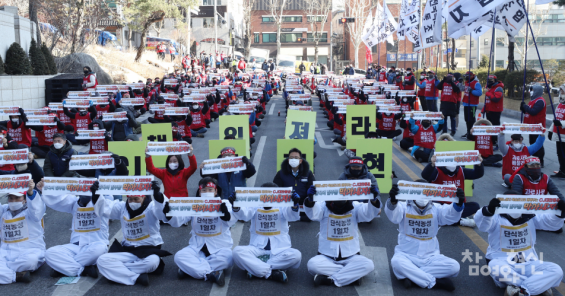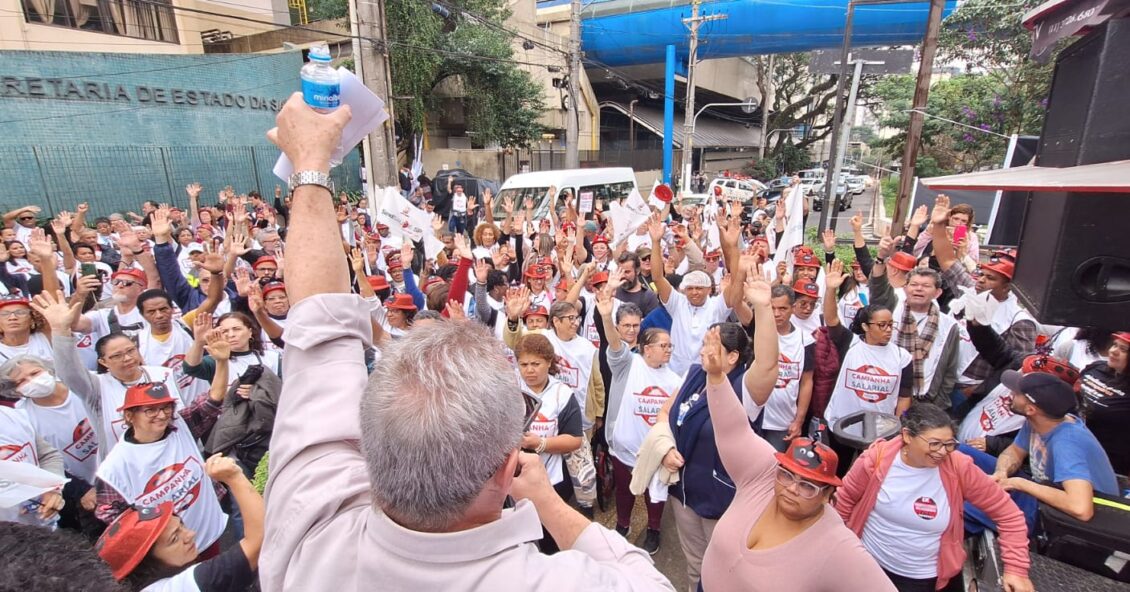Korean logistics union says no to death from overwork
18.03.22
The recent agreement reached by CJ Logistics Delivery Workers Union, a member of UNI affiliate, the Korean Federation of Service Workers Unions (KFSU), is a step towards addressing workplace conditions that contribute to death from overwork (or kwarosa) in the South Korean logistics sector.
The union launched a strike against CJ Logistics, Korea’s largest logistic company, in late December 2021 to protest against anti-labour behaviour.
The strike, lasting over two months, ended on March 3, 2022, after the CJ Logistics-Agency Association finally approached the union to negotiate a settlement to curb further loss of business.
More than 90 percent of the union’s members approved the agreement. The key provisions are:
- Union members will return to work after signing the Standard Employment Contract Form.
- The Agency Association representing CJ Logistics will discuss with the union about the complementary agreement to address the toxic provisions of a 6-day workweek and a same-day delivery guarantee.
- All union members will not be liable for any legal claims made against them.
Bro Jin Kyung-Ho, President of the CJ Logistics Delivery Workers Union, says in a union statement, “We will not return to the slave-like conditions which result in death from overwork. I hope this agreement will energise us to step up the work to prevent death from overwork with full support from society.”
Bro Kang Gyu-Hyok, KFSU President, says, “We join in this fight to ensure our delivery workers can lead a dignified human life and no longer fearing they will die from overwork.”
The problem of death from overwork flared up when more companies turned to e-commerce and promised quick same-day or next-day delivery during the pandemic. The demand for delivery had enriched some companies, such as CJ Logistics, which pocketed a record-breaking operating profit of W198.3 billion in 2021 (US$162.1 million).
At the same time, the workload for thousands of logistics workers climbed exponentially. Logistics companies pressure delivery workers to perform unpaid work to sort and classify items before the actual delivery occurs.
These laborious tasks take up to 4 or 5 hours, combined with the delivery work; many delivery workers work way beyond the legally mandated maximum 60 hours workweek, including 12 hours of overtime. With more pressure and little rest time, twenty-two delivery workers died from overwork in the first year of the pandemic in 2020.
A tripartite social agreement was signed in 2021 to prevent such tragic, avoidable deaths. It includes guidelines to improve item classification work before delivery, limiting working hours to 60 hours per week, and increasing the delivery cost of W170 per item (US$0.14) for workers.
However, problems persist as implementation is slow on the ground.
Some terminals continue to ask delivery workers to perform item classification without compensation. Companies like CJ Logistics raised the delivery cost for clients to W242.5 (US$0.20) but the delivery workers it engages only receive W40.2 per item (US$0.03), a far cry from the recommended W170 (US$0.14) in the Social Agreement.
The CJ Logistics Delivery Workers Union had initially filed a case with the Central Labour Commission after the company rejected dialogue with the union. The Commission ruled that CJ Logistics, as the main contracting company, was obliged to bargain with the union. However, the company countered with an administrative lawsuit to challenge the ruling. The delivery workers are hired as sub-contractors. They are locked into individual contracts accompanied by service standards agreements containing toxic provisions such as guaranteed same-day delivery and a six-day workweek.
The UNI Asia and Pacific Regional Secretary Rajendra Acharya says, “We are in full solidarity with KFSU-CJLWU’s efforts. We are now two years into the pandemic, and this is not the new normal we want to see. Essential delivery workers should not be exploited for free labour and risk dying from excessive labour. Major companies like CJ Logistics must rethink their model and treat the delivery workers as workers, not as sub-contractors.”


